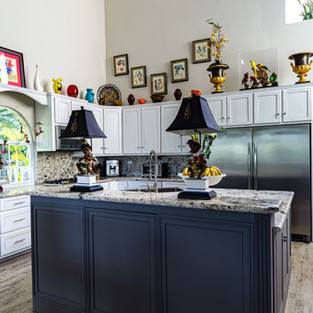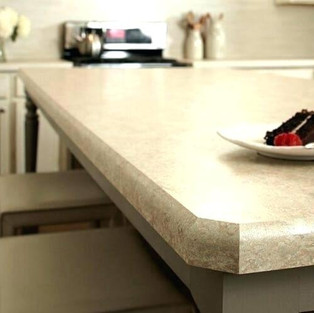10 Popular Countertop Types
- Becka

- Nov 8, 2019
- 7 min read
The kitchen countertop is an essential component to bring the room together. It's the foundation of decor and bares the burden of setting the tone and feel of the space. But what kind should you go with? Shopping for countertops may have you feeling overwhelmed by the number of choices, but in reality is there are just a handful of materials. There's certainly a lot of choice within those materials: hundreds of colors, patterns, and textures, in materials ranging from natural stone to acrylic sheets to quartz composite and exotics like slate and reclaimed wood. But the basic types are relatively few and it's easy to sort out which ones are candidates from your kitchen. Here we take a look at the pros and cons of 10 popular options.

1. Quartz
[cost: begins around $70 per sq/ft]
Quartz is easily king of kitchen countertops. It was originally developed as an engineered, high-end alternative to granite. It can typically contain up to 93% of quartz particles and other materials and can be shaped into slabs and bound with resin. Since quartz is non-porous and does not have to go through regular re-sealing, it's considered to be highly resistant against staining and is one of the most hygienic countertop options for homeowners to chose from. It's also extremely strong,
making it super durable against most every day activities.
Pros:
Can be formed into any shape necessary
Typically looks like natural stone
Low maintenance
Easy to clean
No sealing is required
Extremely strong / durable
Non-porous
One of the most hygienic options
Slabs are uniform, no imperfections
Can be custom fabricated in any shape or size
Adds real estate value to the home
Available in a broad range of colors
Cons:
Not a real stone, which some people may not appreciate
Very expensive
Extremely heavy (some cabinets may have to be reinforced prior to installation)
2. Granite
[cost: begins around $40 per sq/ft]
Granite's natural beauty and near diamond-hard durability make it an ideal material for countertops. For years it has dominated the countertop scene, especially for homeowners who want something strong, durable and good looking. Granite defines elegance in a kitchen. Even modest kitchens seem like luxury spaces when flavored by its beauty. It's biggest downside: it's porous. This means liquids can seep through the surface and cause it to stain and increases it's probability of allowing dangerous bacteria to breed that can leave your countertop unsanitary for use. The porous issue can be resolved by sealing with granite surface with a non-porous sealant, but it will eventually wear off with time and wear, which means it will need to be re-sealed several times throughout its lifespan.
Pros:
No (or low) visible seams
Very strong and durable surface
Heat resistant
Adds real estate value to the home
Comes in a variety of color options
Cons:
Porous material
Can be easily stained and can gather bacteria buildup
Must be re-sealed throughout its lifetime (can get expensive)
Slabs may have imperfections
Can crack is stressed or improperly installed
Knives are quickly dulled by cutting on granite
Can get expensive
3. Marble
[cost: typically $120+ per sq/ft]
Another natural stone commonly used in kitchen countertops is marble. Since no two sheets of marble are exactly the same, each countertop will be entirely unique. Because of its extremely high price tag, marble is not often seen on the countertops of whole kitchens. More often, its luxurious look is limited to use on an island or section of countertop reserved as a baking center. Although a highly prized component to add to your room, marble may not be the best choice for kitchens due to its penchant for staining and scratching. Newer sealers can reduce its upkeep, but this is a considerably more temperamental stone than granite or soapstone, which means you'll have to re-seal much more frequently.
Pros:
Waterproof and heat resistant
Exceptionally beautiful
Boldly unique; luxury feature
Adds real estate value to the home
Cons:
Extremely expensive
Not possible to DIY
Can be scratched; repairs are difficult
Porous material
Must be re-sealed throughout its lifetime (can get expensive)
4. Soapstone
[cost: typically $50+ per sq/ft]
Soapstone is another natural stone, usually dark gray in color with a smooth, silky feeling. It's extremely durable and impervious to virtually all chemicals. As a kitchen countertop, it offers the same benefits in addition to a distinctive look. Since it's non-porous and chemically- and temperature-neutral, it's resistant to staining and scorching. Over time, soapstone takes on an antique-like patina that can be very attractive in certain kitchen styles. Contrary to expectations, the architectural soapstone used for countertops is actually quite hard and resistant to stain. However, it is susceptible to scratch over time, which can add to the antique patina of the stone.
Pros:
Deep, rich color
Stain resistant
Fairly heat resistant
Impervious to virtually all chemicals
Extremely durable
Non-porous
Damage can be easily sanded out
Offers an antique, historic look to a kitchen
Cons:
May darker more than you want over time
Not possible to DIY
Must be treated with mineral oil
Surface can scratch and dent
5. Wood or Butcher Block
[cost: ranges from $30 - $100 per sq/ft]
Wood countertops are a great choice for a work surface. In fact, according to a 1993 University of Wisconsin study in which microbiologists intentionally contaminated wooden cutting boards during testing, 99.9% of the bacteria introduced within 3 minutes of exposure to the wood's surface. The study found that wood cutting boards are safer, bacteria-wise, than plastic ones.
Wood counters are typically made from rock maple - an extremely dense, blond hardwood - but teak, walnut, cherry and oak are also used. There are 3 common styles: edge grain, end grain, and wide plank. Edge grain counters are made of long, thick strips of wood that are glued together with the edge grain facing up. End grain counters (or Butcher Block) have relatively short, square sticks of wood that are joined together with the tough end grain facing up. Wide plank counters are made by edge-gluing wide boards together. It's beautiful, but also most susceptible to cracking and warping if it's not meticulously maintained.
Pros:
Provides a warm feeling to the room
Ideal work surface
Heat resistant
Relatively easy to clean
Very long lasting when properly cared for
Can be sanded and resealed, as needed
Offers a quaint, country look in most kitchens
Cons:
Medium maintenance
Will show knife marks
Fairly expensive countertop material
Can be damaged by water and stains over time
Bacteria build up can be a problem if not properly maintained
Wood is subject to cracking if not maintained
Must be oiled and sealed frequently
6. Ceramic Tile
[cost: begins around $2 per sq/ft]
You can use all kinds of tiles to make a countertop, but the most popular are ceramic and stone. Ceramic tile is durable and easy to clean. It's considerably less expensive than natural stone, quartz, or solid-surface countertops, especially for DIYers willing to do their own work. Recent innovations in porcelain tiles offer many more design options than ever before, including tiles that look like wood, marble, or even leather or cork. Ceramic and porcelain tiles offer more design options than nearly any other countertop material. Just be sure to seal any grout used between the tiles to ward off bacteria buildup.
Pros:
Easy to clean
Usually very affordable
Easy for DIYers
Heat resistant
Available in an enormous range of colors and styles
Cons:
Custom tiles can get expensive
Tiles are naturally brittle and may crack under impact
Grout lines can stain and are difficult to clean
Does not carry the same prestige as granite or quartz
7. Plastic Laminate
[cost: begins around $5 per aq/ft]
Laminates are plastic-coated synthetics with a smooth surface that's easy to clean. Countertops are made by bonding the laminate sheets to a particleboard (MDF) core. This affordable material was once ubiquitous in American homes. Plastic laminate is durable and hard-wearing, making it a surprising resilient option. It's easy one of the most affordable countertop materials out there and has the added convenience of being one of the few available as ready-to-install slabs at home centers. Plastic laminate also comes in sheets that are cut to fit. Installation is fairly quick, helping to keep costs down. It's biggest downfall is that it's not heat resistant, so you need to be careful when placing hot pots and pans down.
Pros:
Very affordable options
Comes in a variety of colors
Easy to maintain
DIY installation is relatively easy
Cons:
Can chip or scratch
Not heat resistant
Seams are always visible
May be viewed as "low-end" by potential home owners
Custom edging and backsplash treatments can add expense
Damage is almost impossible to repair
8. Solid-Surface Material
[cost: ranges from $50 - $75 per sq/ft]
Solid-surface material is a man-made material consisting of a blend of acrylic particles and resins that are pressed into sheets and other shapes. Solid-surface countertops and sinks have now been around for nearly 50 years, but at the time of introduction they were regarded as space-age alternatives to natural stone, which they sought to mimic. Once regarded a premium, luxury countertops, solid-surface material is now considered somewhat mid-tier but is still an excellent choice for mid-range kitchens. It can also be a good material in high-end kitchens with a lot of countertop space that would be prohibitively expensive to cover with granite or quartz.
Pros:
Stain resistant
Seams are virtually invisible
Damage can be easily sanded out
Available in a large variety of colors and patterns
Integrated sink/countertop units are available
Low maintenance
Non-porous
Cons:
Can get expensive
Vulnerable to damage from hot pans
No DIY installation; must be fabricated by professionals
9. Stainless Steel
[cost: begins around $78 per sq/ft]
Stainless steel countertops can be found in kitchens ranging from traditional to contemporary. The appeal stems in large part from popularity of stainless steel appliances. It's particularly suitable for the areas around cook-tops and ranges where hot pots and pans are placed or center islands where food prep and serving are the main focus. Because they're instructed to your specifications, you'll always have a seamless countertop.
Pros:
Heat resistant
Excellent for modern-style kitchens
Very easy to clean
Regarded as a "premium" countertop
Adds real estate value
Cons:
Noisy
Very expensive to fabricate
Can be easily scratched (should not used as a cutting surface)
10. Concrete
[cost: typically $100+ per sq/ft]
If you have countertops in unusual shapes, or if you want a truly unique kitchen, concrete may be a good choice for your countertops. Due to their heavy weight, concrete countertops are usually cast in forms right in your kitchen. These are not the same kind of concrete slabs used in sidewalks, but highly polished slabs that may even be textured or acid-stained to produce colors. Although concrete can be subject to cracking, new treatments can reduce this tendency. It's extremely versatile and can take on many different colors, shadings, patterns, and sheens to suit any kitchen style. Since concrete is a porous material it will need to be regularly sealed to limit bacteria buildup, which can add to its already pricey cost.
Pros:
Can be color-tinted
Heat and scratch resistant
Provides a look that is exotic and unusual
Cons:
No DIY installation possible
Cracking may occur over time
Costs are high due to required custom work
Surface is porous unless regularly sealed
Appearances may seem "industrial", which not all homeowners may appreciate
We'd love to hear from you! What type of countertop do you like best?

































































Comments